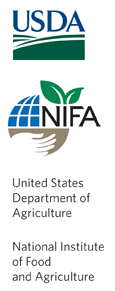___________________________
|
_______________________________________________________________________________
Main
>
Regional Themes
>
Animal Waste Management
> Dry Litter System
_______________________________________________________________________________
Dry Litter System Provides Alternative Waste Management |
Piggeries are literally “backyard” operations with
capacities that range from a few animals to about
twenty-five animals. Piggeries may be small,
but they are numerous. The concentration of animals
per square mile can be comparable to that of large
confined animal feeding operations (CAFOs) of the U.S.
mainland. Island piggeries are rarely far from water,
and the potential to influence shallow aquifers, island
streams, or coastal waters is substantial. Piggery effluent
represents a significant source of nutrient runoff, fecal
contamination, and zoonotic disease throughout the region.
Affected areas include the Northern Marianas Islands, American
Samoa, Micronesia, and Palau.
|
| Overview |
| The piggery effluent problem
in the Pacific has two points of contention. One issue is education;
local farmers aren't familiar with the potential health hazards posed
by the effluent or principles of contaminant transport. The
other issue is an economic one. An alternative system for waste
management, if we expect it to be utilized, must be affordable to the
farmer. A manual on how to build your own Portable Dry Litter Pig Pen is available. |
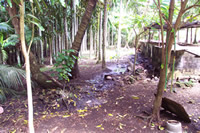 |
|
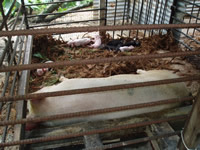 |
|
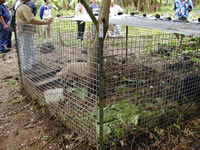 |
| The Challenge: Unmanaged effluent from a piggery inevitably find their way to local surface water systems. |
|
The Solutions: Dry-litter (above center) and portable pen (above right) systems offer affordable means of effluent management (above right). |
| |
| Education equals Economic Successs |
Land Grant Extension Researchers from the University of Hawaii and Northern
Marianas College, in conjunction with USDA-CSREES cooperators and EPA,
have been addressing both of these issues in a recent series of education
workshops in the Northern Marianas. These workshops foster stewardship
of water resources and introduce two affordable solutions for responsible
waste management; a dry-litter system and a portable pen system. Three
workshops have provided education to roughly 100 participants so far,
with some participants choosing immediate adoption of these alternative
management techniques. Future workshops will advocate the economic advantage
of using the nutrient-rich "wastes" in on-farm composting
and fertilization. Dry Litter Pen Manual.
|
| Contacts
Northern
Marianas College
Dr. Alan Sabaldica - Principal
Investigator, Northern Marianas College Cooperative Extension
Lawerence Duponcheel
- USDA-CSREES Northern Marianas Water Quality Coordinator
University of Hawaii
Glenn
Fukumoto- Cooperative Extension researcher
Dr. Carl Evensen - USDA-CSREES
Hawaii Water Quality Coordinator |
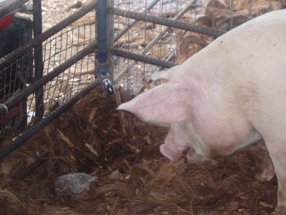
A farmer immediately
adopted the dry litter system after participating in a workshop held in Tinian.
He is extremely happy with the system, commenting that he witnessed
immediate reductions in water use, visible effluent, and flies.
|
|



